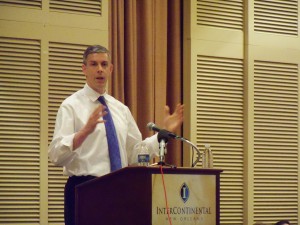The U.S. high school dropout rate – about 25 percent – is both “economically unsustainable and morally unacceptable,” U.S. Secretary of Education Arne Duncan said Friday at the Education Writers Association national seminar in New Orleans.
That failure is also dangerous, said Duncan, adding that education should be the “epicenter” of national security reporting.
He was referring to a November 2010 New York Times op-ed, “Teaching for America” in which columnist Thomas Friedman argued that the poor state of education in the United States is a major risk to its global standing and safety as a nation.
“The bad news is that for years now we’ve been getting out-educated,” Friedman wrote. “The good news is that cities, states and the federal government are all fighting back. But have no illusions. We’re in a hole.”
Chicago is no exception. The Chicago Public Schools’ 2010 dropout rate was 12.8 percent, up from 2009’s 9.7 percent, according to the Illinois State Board of Education.
Students who can’t read on level by third grade are four times more likely to fail to receive a diploma than those who are proficient, according to a study released Friday by the Annie E. Casey Foundation.
Less than a third of CPS fourth graders tested proficient in reading last year in Chicago, according to the state education department.
The Casey Foundation study also found that students who live in poverty are three times more likely to drop out or not graduate on time than those from higher-income backgrounds.
Of students in the city’s public schools, 87 percent are low-income, according to the Illinois State Board of Education.
Students who are both behind in reading and from low-income families fail to graduate on time or drop out at a rate six times higher than average, the study found.
According to the National Education Association, people without high school diplomas are less likely to have jobs and more likely to be in prison than their counterparts who graduated.
If public education today functions in a way that is, again, in the words of Duncan, “morally unacceptable,” then what does the Department of Homeland Security expect, morally, of the people the institution fails?
The answer isn’t new or surprising. In this city of dropout factories, the DHS partners with the police to reduce violence through the Crime Prevention and Information Center, an Chicago fusion center that gathers and analyzes intelligence from local, state and federal authorities.
This is, of course, not to say this center does not fulfill a necessary role. It is rather to wonder why the DHS’s presence in Chicago comes most noticeably in the form of cameras monitoring the streets and scanners monitoring our airports.
When we know stronger schools would mean safer streets, why is security a fleeting rationale for improving schools rather than improving schools a central theme in securing the nation?
The first instance of “comprehensive federal education legislation” was the National Defense Education Act in 1958, fueled by the need to produce the world’s best thinkers in the Cold War, according to the Department of Education.
The Obama administration has said improving math and science education is a goal to keep the country competitive.
Duncan said on Friday that the United States is losing jobs because companies can’t find thinkers strong enough to fill positions needed and that only 25 percent of American young people qualify to even join the military.
With young Americans unprepared at a basic level to serve the country, it’s clear that better schools would lead to a smarter, stronger America.






